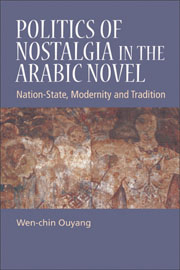Book contents
- Frontmatter
- Contents
- Foreword In the Realm of Memory
- Acknowledgements
- PART I NOSTALGIA: POLITICS OF THE PAST
- 1 ‘The Invention of Tradition’
- 2 The Mysterious (Dis)Appearance of Tradition
- PART II MADNESS: IN THE RUINS OF DREAM AND MEMORY
- PART III NARRATING THE NATION: TIME, HISTORY, STORY
- Epilogue Post-national Impulses
- Bibliography
- Index
2 - The Mysterious (Dis)Appearance of Tradition
from PART I - NOSTALGIA: POLITICS OF THE PAST
Published online by Cambridge University Press: 05 August 2013
- Frontmatter
- Contents
- Foreword In the Realm of Memory
- Acknowledgements
- PART I NOSTALGIA: POLITICS OF THE PAST
- 1 ‘The Invention of Tradition’
- 2 The Mysterious (Dis)Appearance of Tradition
- PART II MADNESS: IN THE RUINS OF DREAM AND MEMORY
- PART III NARRATING THE NATION: TIME, HISTORY, STORY
- Epilogue Post-national Impulses
- Bibliography
- Index
Summary
‘ARGUING WITH THE PAST’
In Youssef Chahine's 1997 film, Al-maṣīr (Destiny), the occasionally violent conflict between the secularists and religious fundamentalists in Egypt today is portrayed as a clash between the ideology of Ibn Rushd (Averroes), the well-known Andalusian Muslim philosopher, and that of the followers of al-Ghazzālī, religious fanatics who would impose their own world view at all costs. The irreconcilable difference lies in the position of both with regard to human reason, the will of the individual and life, symbolised by worldly pleasures, such as love, music and dancing. Whereas Ibn Rushd is portrayed as a champion of all, al-Ghazzālī is made the symbol of uncompromising, community-oriented traditionalism that leaves room for none; in fact, his followers – portrayed as members of a cult-like Sufi ṭarīqa – would resort to assassination of those who do not conform or convert to their way of life. Chahine's indictment of al-Ghazzālī, albeit exaggerated, is not unfounded in some of the current assessments of al-Ghazzālī's contribution to Islam as, let me borrow the words of W. Montgomery Watt, an ‘outstanding theologian, jurist, original thinker, mystic and religious reformer’; in fact, it parodies current Islamic discourses.
Al-Ghazzālī's ‘religious reform’ is on hindsight considered by many conservative Muslim thinkers pivotal in the establishment of what scholars of Islam would call Sunni orthodoxy. His attacks on theology, Shi⃓ism and particularly philosophy, as he is deemed to have summarised in Al-munqidh, set the trend for the way subsequent ‘orthodox’ Sunni Muslims thought about Islam as exclusive of these areas of knowledge.
- Type
- Chapter
- Information
- Politics of Nostalgia in the Arabic NovelNation-State, Modernity and Tradition, pp. 44 - 74Publisher: Edinburgh University PressPrint publication year: 2013



